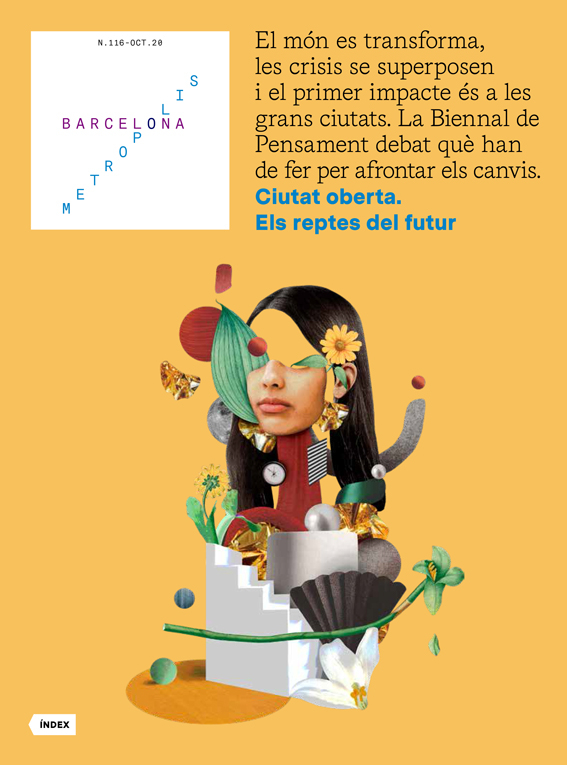Treading carefully and not looking too far ahead. The post-lockdown future of culture
- Culture Folder
- Debate
- Oct 20
- 12 mins
Cancelling, postponing or rethinking. These are the options Barcelona’s cultural initiatives have had to decide between during the Covid-19 lockdown. Each project has chosen its own path, but they all share common concerns. Combining digital and physical formats, reconnecting with local audiences and finding ways to survive financially constitute some of the priorities.
When considering the future, cultural agents do not look too far into the future. The impact of Covid-19 is still being felt and, rather than imagining unattainable scenarios, the sector highlights the importance of actions that have been taken in recent months. It is these actions that mark the near future, which entails, among other concerns, altering programmes, paying back loans that companies have needed to sustain their business since March and preparing for a possible resurgence.
All those from different cultural backgrounds with whom we spoke agree that it must be borne in mind that the problems facing culture are age-old and that the only thing that a health crisis such as the current one does is bring them to the fore. The after-effects of coronavirus do not only underline the need to deal with the setbacks caused by this disease, but also emphasise the importance of defending artists, managers and, in general, the people who make up the world of culture; to offer them good contractual conditions, to encourage their work and, also, to create a cultural model focused on the city’s residents, so that the residents, who are always present, can help them overcome the pandemic.
So from now on, what is and what isn’t tenable in the sector? How does each discipline tackle the economic crisis? How should physical and virtual spaces coexist? What demands do cultural workers make on administrations, and how do they appraise the response made by institutions during the lockdown? We ask them.
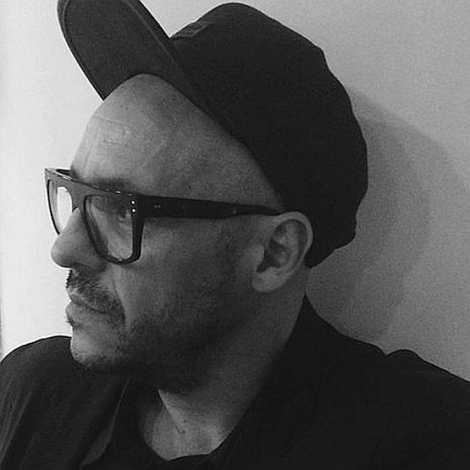
Valentín Roma. Director of La Virreina Centre de la Imatge
The Covid-19 crisis caught La Virreina, a museum institution located on Les Rambles in Barcelona, in the throes of their anniversary: “We are celebrating our 40th anniversary and we planned to strengthen the editorial line-up”, explains Valentín Roma. The director tells us they have been able to preserve the exhibition programme but that, as a result of Covid-19, they have “expanded the number of books and reduced courses and conferences”. According to Roma, although La Virreina already intended to reflect on the place it holds in the public sphere, now it is time for all institutions to follow suit, especially considering that the success of cultural initiatives shall no longer be able to be gauged based on the number of visitors: “Coming is a time when we all have to develop a more complex relationship with institutions”, a fact that will be linked to the rise in local audiences and the fall in tourist visitors. “We will be more mindful when visiting museums, less tired of a dynamic of mindless recreation, and institutional equidistance will be penalised.” According to Roma, small and modular spaces will be better equipped to tackle the setbacks of the future, another reason to say that “times of hopeful complexity lie ahead”.
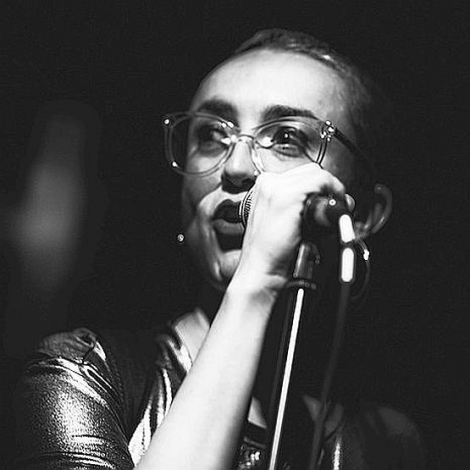
Maria Sevilla. Poet and co-programmer at Horiginal
L’Horiginal, a meeting point on the Barcelona poetry scene, cancelled the entire programme and has not returned until September. Since March, it has only undertaken one activity, the night before the Feast of Sant Jordi [St. George’s Day, the Day of the Book]. “People were losing their jobs, friends and relatives, and we decided not to ask them to do things from the privacy of their homes.” Maria Sevilla, Laia Carbonell and Raquel Santanera, the project programmers, are concerned about “the parameterised forms of the networks, compared to the direct and performance-based model of recitals”. Sevilla finds it disconcerting to think about whether the model of culture should change as a result of Covid-19: “Post-Covid-19 problems remain the same as ever”, such as the difficulty of creating “when it is a sporadic peripheral activity in your life”. L’Horiginal is a self-managed project, which spares them red tape but does not allow them to pay the poets taking part in recitals. Nevertheless, what Maria Sevilla is calling for is a change in the city model: “Over the recent months, many of us have been able to get by without tourism, which has not been the case for most cultural initiatives; by contrast, a place like the Antic Teatre is always at risk”.
“Discontinuity affects us enormously and brings the precarious situation we faced before to light.” Clara Cols. Codirectora artística de la Sala Flyhard
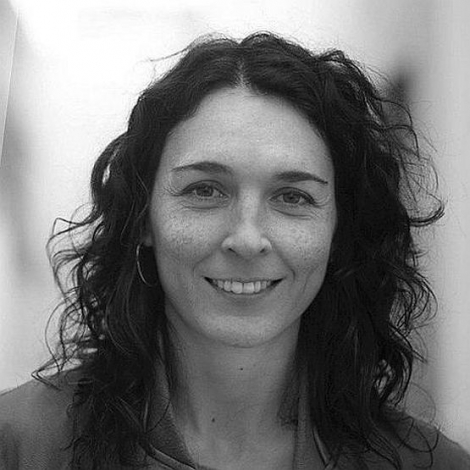
Clara Cols. Co-art director of the Sala Flyhard
The Sala Flyhard is a theatre in Sants. Following the coronavirus outbreak, reduced capacity was initially announced as a measure, but Clara Cols and the other theatre members decided that holding events was not worth the trouble: “We have 45 seats and, if we could only occupy a third, we would be left with 15; it wasn’t viable.” At that time, the theatre sector agreed and decided to close its doors. “We also postponed the programme because the actors couldn’t rehearse”, recalls Cols. The Sala Flyhard put temporary layoff procedures in place, offered recorded works free of charge and hopes to open in the autumn. As regards the sector, she states that “discontinuity affects us enormously and brings the precarious situation we faced before to light”. For this reason, Clara Cols calls for a review of labour rights for theatre teams (actors, set designers, costume designers, lighting technicians, etc.) and access to different contractual solutions. However, she maintains that “many subsidies have emerged and we have noticed more flexibility on the part of institutions” over the Covid-19 pandemic. As for budgets, Cols says she understands that “everything is hanging by a thread” now, but begs that culture budgets not be cut: “We are small theatres that have put in loads of hours from the get-go and that have now achieved a certain stability, which allowed us to hire people and hold productions without a portion of the box office earnings. If we manage to reach a younger audience, that is not as vulnerable, and learn to live with screens, we will get by”.
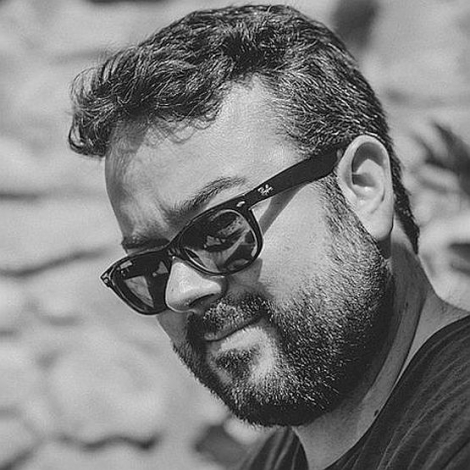
Víctor Sala. Co-director of Serielizados
During the lockdown, the consumption of video-on-demand platforms grew 53% globally. In Catalonia, the company in the sector that gained the most subscribers was Netflix, followed by Amazon Prime and HBO. Amid the success of enjoying audiovisual media from the comfort of your sofa, the promoters behind the Serielizados Fest began to redefine their event, which takes place in October: “We propose two scenarios: either all virtual, or mostly virtual with some physical events”, explains Víctor Sala. The series sector is not the most hit by the crisis, but it does herald problems in the medium term: “The time when we watched the most audiovisuals was when the least number of them were being made, because filming wasn’t possible, and we will notice that next season.” Now, members of the Serielizados Fest depend on a possible resurgence in the autumn: “We will not invite international guests because we cannot risk paying them; we are a small company and the economic risk is high because, apart from subsidies, we depend on earnings from the box office and we do not know how it will work”. In this regard, there is a gap in the sector for small projects: “Until the United States has strong releases, there may be room for independent or local content.”
“Changes in the sector must be decided by cultural agents, not by the Administration, in a responsive manner.” Miquel Curanta. Director of the Institut Català de les Empreses Culturals [Catalan Institute for Cultural Companies]
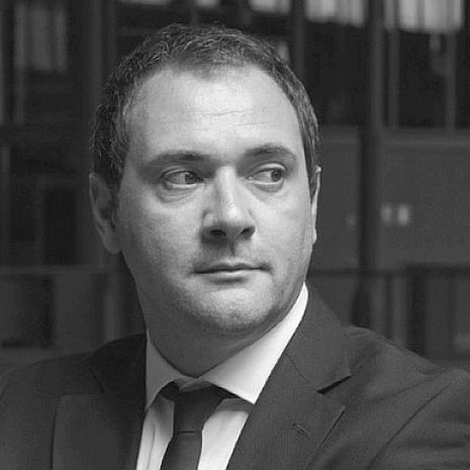
Miquel Curanta. Director of the Institut Català de les Empreses Culturals (ICEC)
“Culture does not need to change, but it is constantly evolving”, claims Miquel Curanta, director of the ICEC. He thinks that cultural sector has to face a number of issues as a result of coronavirus that, in the long run, would have had to confront anyways. “How are streaming formats monetised? How do artists creating from home receive subsidies? How can more immersive audiovisual filming be achieved? Changes in the sector must be decided by cultural agents, not by the Administration, in a responsive manner”, he reminds us. The Institute has divided crisis management into three parts: “Analysing how regular budget lines can help minimise the effect of the pandemic; considering what changes we can make to subsidies to avoid the withdrawal of aid; and, finally, proposing a new set of measures”. The sector has requested support and additional funds from the Administration. Regarding the changes, Curanta calls for cool-headedness and highlights, among other things, the 8-million-euro recovery fund that the ICEC has launched to help cover the structural costs of cultural enterprises for the duration of the state of alarm, such as the rental of premises or the payment of fees and supplies.
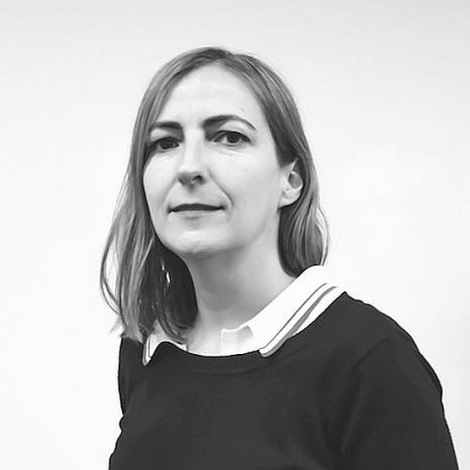
Isabel Sucunza. Bookseller from La Calders bookshop
“When people started saying, ‘Bookshops should be open, they’re an essential service!’, we said, ‘We don’t want to!’”, explains Isabel Sucunza from the bookshop La Calders. She reminds us that, however nice it may be to talk about the recovery of culture, workers are also afraid and have to look after themselves. The book sector has been one of the most visible during the Covid-19 crisis, especially because it coincided with St. George's Day, a major event for the book world, which in many cases depends on it. “This Sant Jordi, what have most lost out are potential bestsellers that are only purchased during the feast day”, Sucunza points out. At La Calders they have managed to escape the decline thanks to a guaranteed strong local network: “For Sant Jordi, we never set up a stall on La Rambla or Passeig de Gràcia, so many people who drop by are already customers again on the lookout for a book this year, locals and regular customers“. Sucunza is pessimistic as regards the future and believes that nothing will change in terms of cultural habits, but she is concerned for workers in the sector: “The economic crisis is not being felt at the moment, but rather the health crisis”, she recalls. “Lots of people have had to apply for loans and fall into debt, and we’ll notice that next year.” As for the Administration, the bookseller believes that “the feeling was that they were doing what they could, but they did not respond rapidly”. For example, the postponed Sant Jordi, announced to be held on 23 July; however, no information was provided on how it would take place until early June.
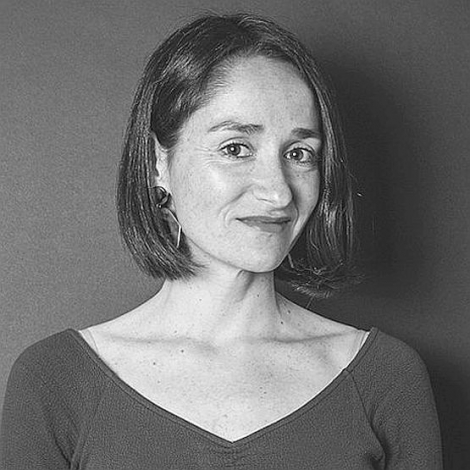
Marta Salicrú. Director of Radio Primavera Sound
Radio Primavera Sound (RPS) is a radio project parallel to the music festival held every summer in Barcelona. Projects like this have allowed major events to hold onto their brand despite cancelling or postponing this year’s editions. However, its promoters assure us that large formats won’t disappear: “Festivals will continue to take place in the future.” In the case of Primavera Sound (PS), the event was not held in 2020, but the 2021 edition has already sold out. As a new development implemented during the lockdown, the web development department of the PS created a platform to standardise digital content that will also be of use for the “new normal”. In August, the festival has organised a short series of concerts with all the necessary safety measures, something highlighted by Salicrú: “The live music sector is religiously following the regulations, but there is a difference between our cautiousness and the attitudes we see on the street and in the hospitality industry“. The director of RPS calls for coherence from the authorities: “If we note that the circumstances are normal across much of the economy, perhaps we could be a little less rigid with culture.”
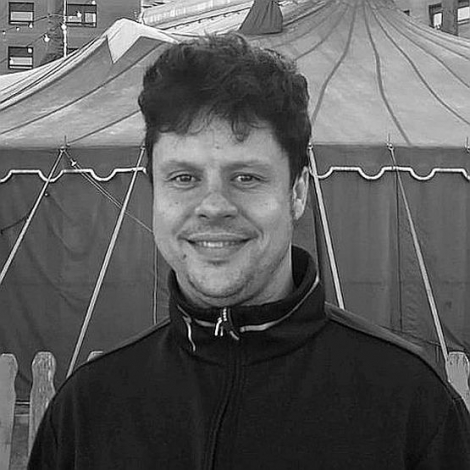
Joan Ramon Graell. Director of circus shows
At this year’s Festival Grec we got to see Estat d’emergència [State of Emergency], a show by the National Circus Production that will tour Catalonia in the autumn, if coronavirus permits. Joan Ramon Graell, its director, explains that the sector “has experienced lockdown without knowing what to do, on the one hand because off-season or off-programme performances have ground to a halt, and on the other because, in the circus, physical training is very important and there are techniques that we haven’t been able to rehearse at home“. As for workers’ situation, circus performers often register economic activity when they put on a show, but not when they rehearse it. Therefore, if at the time of the crisis they were not staging a specific project, they weren’t able to have recourse to aid. Regarding the future, Ramon believes that the cultural sector has never been sustainable, and that the debate on how it must achieve sustainability is repetitive: “We only ask that the rules of the game be clear, because the only cultural policy that has existed so far is inertia”, he says, adding that “we have tried to make State of Emergency as sustainable as possible, taking environmental and economic aspects into account; the narratives revolve around this, but so must the events”.
“We have talked a great deal and the discussions have reached saturation point, but we must be mindful that we are still in the throes of the pandemic and that we do not have the perspective to draw conclusions.” Pepe Serra. Director of the MNAC
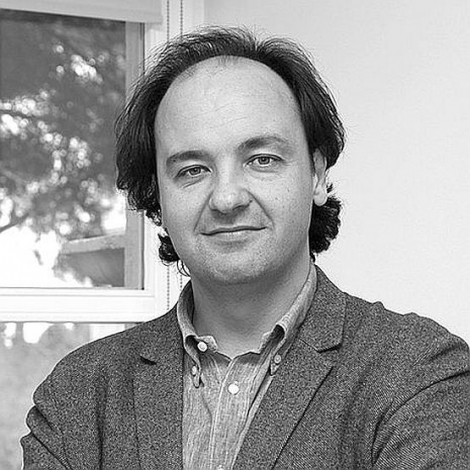
Pepe Serra. Director of the Museu Nacional d’Art de Catalunya (MNAC)
Barcelona’s museums closed on 13 March and started opening as of 1 June, unable to agree on a single date. When Pepe Serra, director of the MNAC, looks back on the recent months, he tells us that “we have talked a great deal and discussions have reached saturation point, but we must be mindful that we are still in the throes of the pandemic and that we do not have the perspective to draw conclusions”. According to Serra, one positive aspect of the lockdown is that it has allowed museum institutions to work on things that were important, but for which they never had time, such as “museums’ larger digital mission, the model of economic sustainability or the raison d’être of our spaces; they are all discussions that we must take advantage of and that we cannot falsely end”. According to the director, the pandemic – which made a huge impact at the time and will continue to do so until we find the vaccine – will not be so critical in the long term: “Everything keeps going and, for example, in the case of Catalan museums, the reduction in capacity is not a major issue because our spaces usually do not reach saturation point like the Louvre”. For Serra, the time is exhilarating despite the challenges it poses, but he believes that the sector must respond in unison: “Our museums should have all opened on the same day, because then we could have launched a good campaign; what matters is not the date, but the message that the public receives”, especially now that less tourism is expected and that museums are turning their strategy towards local audiences.
The newsletter
Subscribe to our newsletter to keep up to date with Barcelona Metròpolis' new developments




